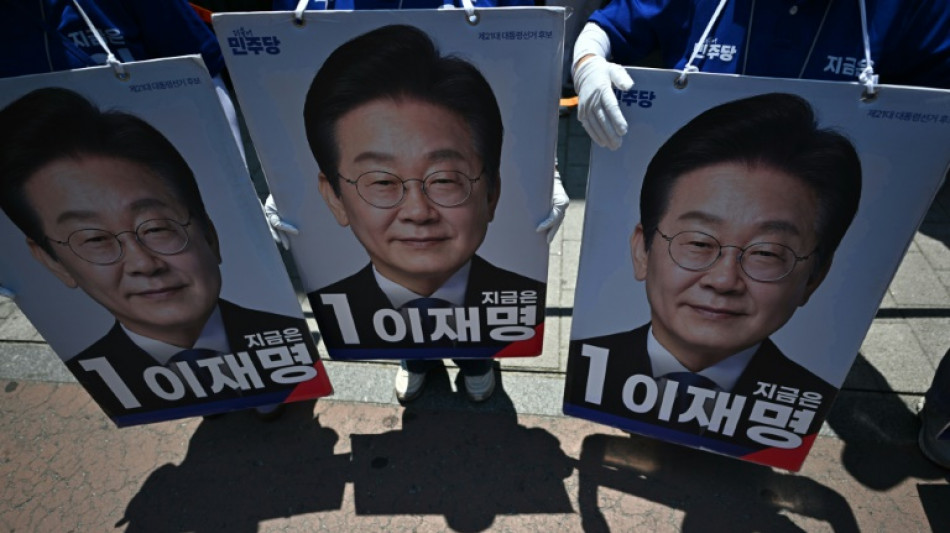
Lee Jae-myung's rise from poverty to brink of South Korean presidency

Lawsuits, scandals, armed troops and a knife-wielding attacker all failed to deter Lee Jae-myung's ascendancy from sweatshop worker to the cusp of South Korea's presidency.
After losing by a gossamer thin margin in 2022, the Democratic Party candidate has returned to the ballot, and is now poised to replace the political rival he was instrumental in unseating.
Opponents decry Lee, 60, for his populist style. But his rags-to-riches personal story sets him apart from many of South Korea's political elite.
After dropping out of school to work at a factory to support his family, he suffered a disabling elbow injury in an industrial accident.
He earned a scholarship to study law and passed the bar to become an attorney.
Lee has used this origin story to cultivate a loyal support base and frame himself as understanding the struggles of the underprivileged.
"You can worry about people outside shivering in the cold while you sit in your warm living room," Lee told AFP in a 2022 interview.
"But you can never really understand their pain."
Polls suggest the margin between Lee and his closest challenger, conservative Kim Moon-soo of the People Power Party, has narrowed in recent days, with some showing a single-digit margin.
But Lee has consistently maintained his lead since the race was triggered by the impeachment of former president Yoon Suk Yeol over his brief declaration of martial law in December.
- Live-streaming a crisis -
South Korea has experienced a leadership vacuum since lawmakers suspended Yoon for deploying armed troops to parliament in his failed attempt to suspend civilian rule.
During the tense minutes following that move, Lee live-streamed his frantic scramble over the perimeter fence as he and other lawmakers rushed to vote down the martial law decree.
"It was a race against time," he recalled in an interview with AFP.
Lee previously served as mayor of Seongnam, south of Seoul, for eight years.
In that role, he helped shut down what had been the country's largest dog meat market -- ending a trade that had once involved 80,000 canines a year.
He later served as governor of Gyeonggi Province -- the country's most-populous region surrounding the capital -- for more than three years.
Lee lost his 2022 bid for the presidency to Yoon by one of the smallest margins in South Korean history.
And in 2024 he was stabbed in the neck by a man posing as a supporter and was airlifted to hospital for emergency surgery.
The attacker later confessed that his intention was to kill Lee to prevent him from becoming president.
If elected next week, Lee has vowed, among other things, to boost South Korea's artificial intelligence industry, with the goal of making the country one of the top three global leaders in the field.
He has also called for holding those involved in the martial law attempt accountable -- promising to "bring insurrection elements to justice".
During his early days in politics, Lee drew criticism for his confrontational attacks on political opponents.
But Kim Hye-kyung, his wife of 34 years with whom he shares two children, insists Lee speaks with "deliberation".
"He's someone who's come up from the margins, from the very bottom," she said in a 2017 interview.
"Just like how a flea has to jump to be noticed, I hope people can understand and view him in that context."
- Legal troubles -
Lee has been dogged by legal troubles of his own, including allegations of corruption tied to a real estate development and violations of election law through the dissemination of false information.
He has denied any wrongdoing, insisting the charges are politically motivated.
In early May, Seoul's Supreme Court overturned a lower court's acquittal of Lee on election law charges and ordered a retrial.
But with the election looming, the Seoul High Court postponed the proceedings until after the June 3 vote.
If Lee wins, legal experts say the proceedings would be suspended due to presidential immunity, and would only resume after his single five-year term ends in 2030.
Lee's opponents argue the charges are serious enough to disqualify him from running.
"With these kinds of corruption allegations, how can you seek public office?" Kim Moon-soo, his main opponent in next week's vote, said during a televised debate on Friday.
F.Lim--TNT